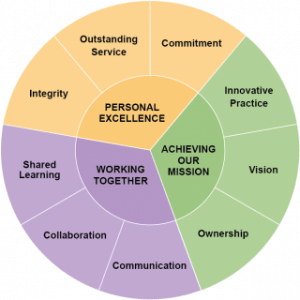From 1st December we will enter our new Appraisal Window, we would like to reconfirm some communication from the last cycle.
Appraisal form
Due to the ongoing impact of Covid-19, colleagues in Library Services are asked to continue with the abridged version of the UCL appraisal form, which can be found at https://www.ucl.ac.uk/human-resources/sites/human-resources/files/appraisal_review_and_development_scheme_short-form.docx .
Appraisals and Covid-19
The position remains that the appraisal write-up should include acknowledgement of any agreed adjustments to objectives, workload or working patterns, for individual members of staff. Where a barrier, such as the impact of COVID-19 or lockdown, may have impacted on an individual’s ability to meet agreed objectives from the previous year, it should not impact negatively on the individual in terms of demonstrating good performance over the past year. Nor should their revised working pattern/workload create a barrier to any learning and development opportunities which have been identified as part of the appraisal process.
How to manage the appraisal documentation
1. The Appraiser and Appraisee should keep a signed copy of the appraisal document, in a confidential file/location, until the subsequent appraisal, when the document should be disposed of confidentially. (If the appraisee leaves the organisation, the paperwork should be disposed of confidentially at that time.)
2. If revisions to the job description have been agreed during the appraisal process, please send an electronic copy to Library HR at lib-hrteam@ucl.ac.uk.
The Libnet appraisals page has been updated with information about the abridged appraisals process: https://www.ucl.ac.uk/libnet/hr/learning-and-development/appraisals.
Developmental Conversations
The Developmental conversations approach allows for two-way conversation to take place which can enhance the appraisal experience through meaningful goal setting and personal development.
Further information can be found by visiting https://www.ucl.ac.uk/human-resources/learning-development/learning-academy/developmental-conversations .
The recommended Developmental Conversations training module is available for staff to complete via https://www.ucl.ac.uk/staff-training/enroll.php?code=ODDC .
Appraisal Targets
In line with the Library Equality, Diversity and Inclusion Action plan, all staff are required to have a target of engaging or undertaking at least one Equality, Diversity and Inclusion associated activity or event in the 2021/2022 academic session. For example contributing content to the Library Equality Diversity and Inclusion (EDI) newsletter, engagement in wellbeing initiatives, attending a training session or team building exercises using the theme of EDI.
When developing the targets, consideration should also be given to the UCL Ways of Working and the indicators relating to the grade of the post that the employee holds.
4 dimensional (4D) goal setting:
UCL has introduced a goal setting framework based upon the following principles:
-
Discover my potential – 1 goal required
-
Deliver my role and alignment to UCL’s strategy – 3 goals required
-
Defer/Discontinue activities that hinder me from achieving my role’s purpose and focus
-
Demonstrate UCL’s way of working – 1 goal required
Further details about UCL’s 4 dimensional approach to goal setting can be found here.
Training
Please ensure you review training completed in the past year and that any mandatory refresher training is set as a training objective. https://www.ucl.ac.uk/human-resources/learning-development/mandatory-learning
There are 9 core mandatory courses:
GDPR refresher course completion required every two years.
Mandatory training for Managers
Managers should complete UCL recruitment essentials before participating upon recruitment panels.
UCL has a vast amount of training available for staff which can be found by visiting the Learning Academy.
 Close
Close




